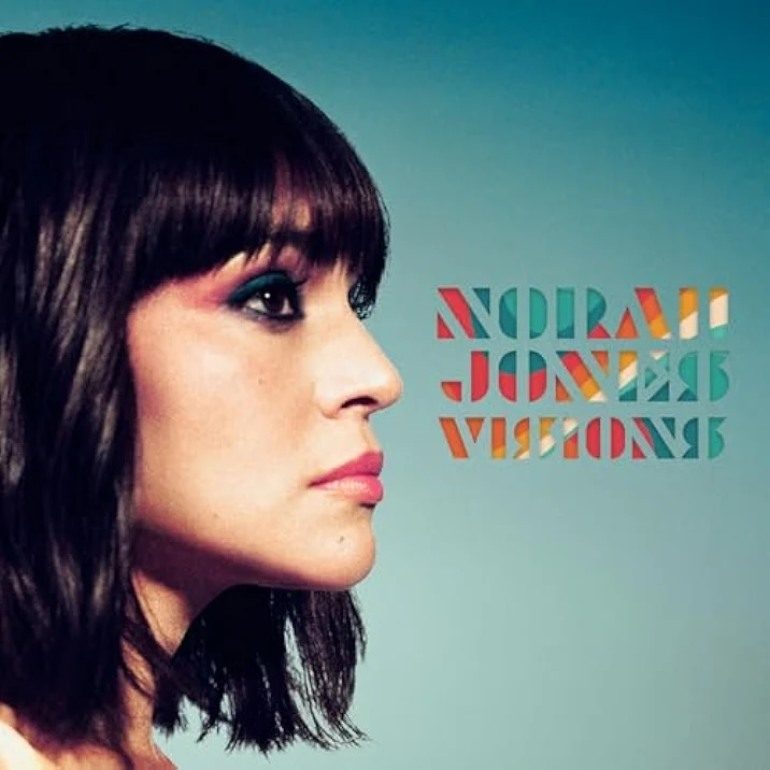

“Swept Up in the Night.”
Norah Jones has done it again, dazzling listeners with a ninth studio album and a perfect soundtrack for the start of spring. Visions is an album comprised of 12 dreamy streams of consciousness. It was produced by Leon Michels under the American jazz label, Blue Note Records, and stands by a ‘no idea is a bad idea’ mindset. Jones was motivated by the unpredictable timing of creativity and the rawness of improvisation. Many of its concepts, framed by the album’s title, are Visions of the night and came to Jones in the moments before bed. This is apparent in the lyrical themes and gentle jazz tone, met by a comfortable at-home ambiance.
Jones’ first embrace, “All This Time,” is safe and warm. Right away she fills the air with a blend of bright harmonies and birds chirping. Jones plays her paramount piano as a call and response with her vocal cry, “Stay with me, I’ll make it easy.” The following track, “Staring at the Wall,” introduces a jazz drum to the jam. The guitar is folky and the rhymes carry a country twang. She celebrates all her capabilities and challenges the boundaries of genre. Her lyrics are quietly optimistic, but at the same time, sting with sadness.
“Walk in the room, starin’ at the wall and I wonder what I came in for at all. Need to travel out of my brain, it’s hard to get in rhythm with the pain. Someone tell me what the hell is wrong, nights away feel quiet and too long.”
When she closes her eyes, Jones can transport herself to a forgotten “Paradise” where she is the “Queen of the Sea.” The next two tracks are like fantasy moods, only within reach when you “Find a place to calm your mind.” They are each an ode to the infinite imaginary world that helps heal wounds of truth. She holds on tight to bliss, patiently “Waiting for the pain to drop” like it has time and time again.
In a press release for Visions, Jones spoke of the lead single, “Running,” as one of those midnight moments “Where you’re half asleep and kind of jolted awake.” This song emulates a heavy heartbeat after a bad dream. It’s the aching and overthinking that come with differentiating a dream from reality. Jones incorporates a catchy repetitive hook in a way that echos a cycle and engrains a message. This becomes a theme throughout the album, appearing similarly in “I Just Wanna Dance,” “On My Way” and “That’s Life.”
“You get lost, you get found. You find love, come unwound. Talk too much, hit the ground. You break up, you break down. Down, down, down again; oh, down again. That’s life, that’s life, that’s life, that’s life.”
The instrumentation of “That’s Life” tells its own story, following the ups and downs mentioned in the lyrics. Melodically, the song starts with an Elton John-style piano ballad and transitions into a cheery ‘Old Hollywood’ swing. Jones is notorious for her sugary vocal layering; however, “That’s Life” is layered distinctly to sound like background singers.
“I’m Awake” is another one of those twilight moments when you ask yourself, “How do you know what is real?” This track resembles a tasteful mix of Jon Batiste piano and James Blake hums. It is a floral pop-jazz tune that moves like a sudden spring out of slumber. It is contrasted by “Swept Up in the Night,” a reflection piece, a dream journal, where Jones attempts to remember the visions that came to her while sleeping.
“I was swept up in the night, someone’s arms who held me tight. Can’t explain the dance or dream, what I felt was quite extreme. Traveled to the furthest place, can’t recall the perfect face.”
The bridge welcomes a smooth horn section that soars alongside Jones’ enchanting vowels. She models the elements of jazz and blues that use wordless vocal melodies to have a conversation with the other instruments. In “Alone With My Thoughts,” Jones sings a sweet ‘ooh’ and then pauses for a response. In comes the timbre of a pipe organ, answering her call but leaving space for the mind to drift in wonder.
The title track “Visions” is a raw acoustic lullaby that spotlights Jones’ poetic lyricism and tonal control. Its simple production is refreshing. All Jones needs is a mic and a guitar to get her message across. Her words shift as her visions become intrusively darker. She is washed away by the brass and strings of a Mariachi, “And I don’t believe I’ll wake up this time.”
